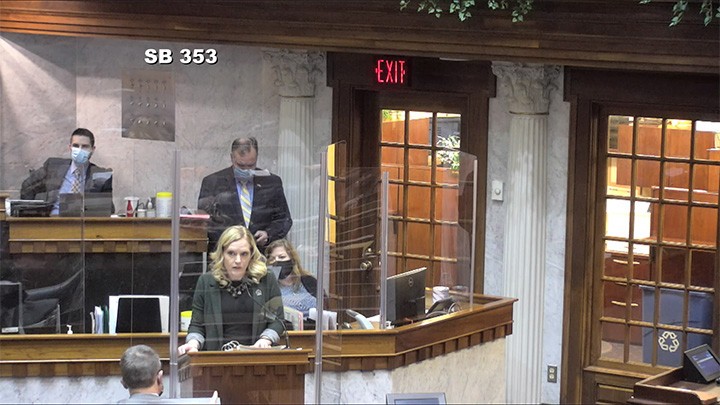
Follow our legislative coverage at The Indiana Citizen, in partnership with TheStatehouseFile.com
In 2020, Gov. Eric Holcomb delayed the primary election from May until June and loosened restrictions on absentee voting as Indiana coped with the outbreak of COVID-19.
Under legislation proposed a year later, he wouldn’t be able to do either.
Senate Bill 353 authored by Sen. Erin Houchin (above), R-Salem, would limit the authority to change the “time, place or manner of holding an election’’—including the authority to loosen requirements for absentee voting—to the General Assembly. Currently, the requirement to obtain an absentee ballot is to fill out an application and to meet certain criteria such as poor health or being out of the voting precinct at the time of the election.
The legislation is being considered as Georgia is seeing the fallout from a controversial election bill. While the bills have significant differences—for example, Indiana’s does not include the provision that voters cannot be offered food or water while waiting in line at the polls—both require additional documentation when applying for an absentee ballot.
The American Civil Liberties Union opposes Houchin’s bill, which since its introduction has been amended to require a driver’s license number or the last four digits of one’s Social Security number when applying for an absentee ballot.
“SB 353 would disenfranchise tens of thousands of Hoosier voters by requiring additional, costly, and unnecessary documentation,” Katie Blair, public policy and advocacy director, said in a statement. “It is especially appalling that following a general election fraught with voter hurdles due to the COVID-19 pandemic, some Indiana legislators are focused on making it even more difficult for Hoosiers to cast a ballot.”
The bill, set to be heard Tuesday morning in the House Elections and Apportionment Committee, was passed by the Senate in February. In presenting the amended bill to the Senate, Houchin said it would ensure that the legislative branch of government had a voice in the conduct of elections.
“It gives the General Assembly the opportunity to weigh in, in an emergency,” said Houchin. “The point of the bill is that we won’t have what we had across the country. We will not see courts and statewide elected officials and others who are not the General Assembly making changes to the time, manner and process by which we vote.’’
During the Senate debate, Sen. Greg Taylor, D-Indianapolis, noted the new limits that the bill would place on voting, saying, “We should want 100% of the people to vote so we should make it easy.”
***
EARLIER: A bill to prohibit the Indiana Election Commission and the governor from altering the times and dates of elections passed the Senate Feb. 22.
 Senate Bill 353, authored by Senator Erin Houchin, R-Salem, advanced to the House in a 34-15 vote. It would give only the Indiana General Assembly authority to change the timing and procedures of elections.
Senate Bill 353, authored by Senator Erin Houchin, R-Salem, advanced to the House in a 34-15 vote. It would give only the Indiana General Assembly authority to change the timing and procedures of elections.
***
An Indiana Senate bill that would have set new requirements for voting has been amended instead to give the Indiana General Assembly sole authority to reschedule elections and expand absentee voting as Gov. Eric Holcomb and the Indiana Election Commission did with the Indiana primary in 2020.
Both the Senate Elections and Rules and Legislative Procedures committees on Feb. 15 approved the amended Senate Bill 353, sending it to the full Senate for review.
As introduced in in January by Sen. Erin Houchin, R-Salem, the bill would have required an individual to show proof of citizenship to register to vote as well as post-election “risk-limiting audits.’’
That language was removed by the committee and replaced with the provision that only the state legislature could set the “time, place or manner” of an election. The amended bill also states that the governor does not have the power “to institute, increase, or expand vote by mail or absentee vote by mail,” limiting that authority to the Indiana General Assembly as well.
Amid the outbreak of the COVID-19 pandemic in March 2020, Holcomb issued an executive order changing the date of the primary election from May 5 to June 2 and to allow no-excuse absentee voting. The Indiana Election Commission later voted to make the change as well, although no-excuse absentee voting was not allowed in the general election. — The Indiana Citizen
Alexa Shrake contributed reporting. She is a reporter for TheStatehouseFile.com, a news website powered by Franklin College journalism students.
John Krull Commentary: Georgia on our minds, new version of an old tune